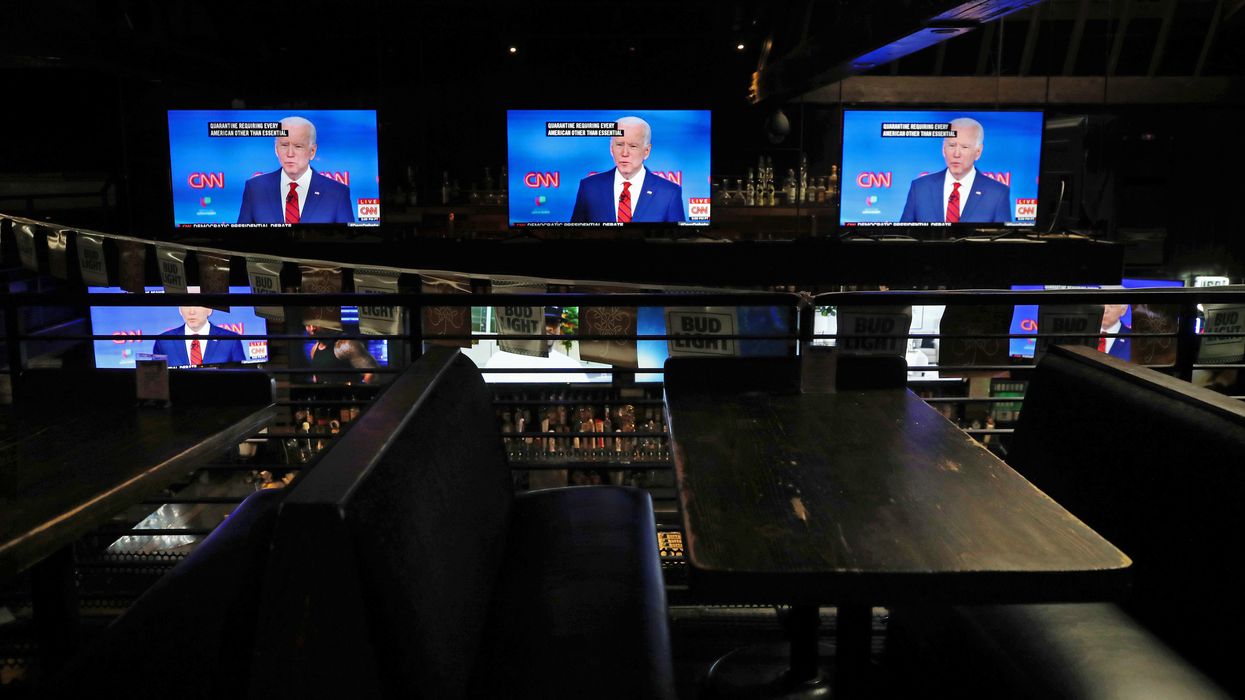Update: Republican Gov. Mike DeWine of Ohio went to court Monday afternoon hoping to delay until June 2 the in-person Democratic presidential primary vote set for Tuesday, saying that proceeding would not comply with new federal coronavirus guidelines against gatherings of more than 50 people. He filed the suit because elections in the state are run by counties, so DeWine does not have the authority over polling places as he does over the restaurants, movie theaters and other places he ordered shut on Sunday. Ohio has 50 known cases of the virus as of Monday.
The four presidential primaries scheduled for Tuesday are going ahead on schedule, albeit with last-minute modifications and serious wariness about turnout in light of the intensifying national coronavirus shutdown.
Officials in Florida, Ohio, Illinois and Arizona have all said they are taking extra health precautions so voting in person remains safe. Besides, they say, so much early balloting has already happened that closing the polls on the final scheduled day of voting would severely muddy the integrity of the results.
After Tuesday, however, the national political calendar is increasingly in flux — making some voting rights advocates wary about the potential for suppression, while other arguing the Covid-19 pandemic presents a silver lining for democracy reform if it prompts more widespread adoption of voting from home and by mail.
After this week, the next presidential primary was to have been Georgia's on March 24, but the state has postponed the contest until May 19, the regular primary day for congressional and state contests. Louisiana acted even more dramatically, postponing its presidential contest from April 4 until June 20 — two weeks after the last nominating contest on the schedule, potentially subjecting the state to a loss of convention delegates as punishment for skirting party rules.
Wyoming, meanwhile, has called off its April 4 in-person caucuses in favor of a totally vote-by-mail system.
New York, Pennsylvania, Wisconsin and four other states also have primaries set in April. None of those plans has been altered yet, although leaders in Albany have been discussing a potential eight-week delay while the state Elections Commission in Madison was taking steps to encourage absentee voting and sending mail ballots to nursing home residents.
A broad coalition of civil rights and voting rights groups warned Monday that disrupting the primary timetable now could disenfranchise legions of voters — but that there was still sufficient time to engineer safer, more convenient options for the fall.
"Sudden changes to election times, locations, and more have been proven to create barriers to, and in some instances the denial of, citizens their right to vote," the coalition said, but "all states should have contingency plans in place for additional voting options for the general election."
What those plans should include may become clearer Tuesday. Officials in the four primary states say their worries are not so much about keeping their equipment sanitary all day and enforcing "social distancing" among voters.
Instead, they cite concerns that last-minute relocation of polling stations — mainly to get them out of assisted-living centers and nursing homes because the elderly are more vulnerable to the virus — will cause confusion. They are also worried about the potential for either plummeting same-day turnout, because of anxieties about being in public, or excessively long wait times because many of the mostly older corps of poll workers decline to show up.
In theory, the intersection of Covid-19 and democracy would be softened if the contest for the Democratic nomination ended, but there was no indication at Sunday night's debate that Sen. Bernie Sanders is contemplating bowing out now that former Vice President Joe Biden has amassed a very-difficult-to-overcome delegate lead. It's also the case that, for the rest of the spring, many of the presidential contests are on the same days as primaries for other offices.
If the pandemic threatens to persist long enough to make it dangerous to hold the general election Nov. 3, Congress has the power to postpone the election — an unprecedented step that would require an extraordinary measure of bipartisan support in order to ward-off suspicions that democracy itself was being suspended.
Several good-governance and civil rights groups have already said this extreme measure would be untenable.
Alternatively, Congress could pass legislation requiring all the states to permit no-excuse and remote absentee voting. That would be welcome news to many who advocate for making it easier and more convenient to exercise the franchise — even when long lines and cramped quarters at polling places do not reset a public health hazard.
A version of this idea was proposed last week by Democratic Sen. Ron Wyden of Oregon, whose bill would require mail-in or drop-off paper ballots be available nationwide if more than a quarter of the states declared a state of emergency because of coronavirus — but also provide $500 million in federal aid to carry out that mandate.
The National Vote at Home Institute said it was working with legislators in Michigan, Maryland, New Jersey, Georgia, New York and Rhode Island on possible measures to expand the use of liberalized absentee mail-in voting this year.
Within days, the group said, it will unveil a "scalable strategic plan that can be adopted by election officials in every state across the country." Although no single plan will work in every state, the group said, "we are confident that we can deliver an actionable way to preserve the integrity of elections through November and beyond."
"It is imperative for state election officials to address voters' and poll workers' fears by limiting the need to cast an in-person ballot," the League of Women Voters said Monday in urging all the states and both parties to permit or expand mail-in voting during both the primaries and in November. "Our top priority must be the health and safety of the American people while simultaneously upholding the rights of all voters."




















Trump & Hegseth gave Mark Kelly a huge 2028 gift